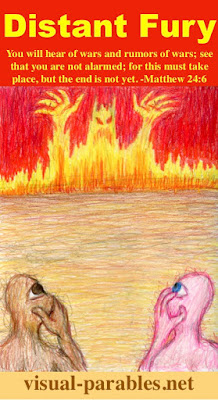But just as he who called you is holy, so be holy in all you do; for it is written: “Be holy, because I am holy.” -1st Peter 1:15-16
Yet, I contend that our failures in achieving holiness often stems from approaching it so one-dimensionally. Our misunderstanding of it has left us confused on where to draw the line on many key issues as well. So let's take a closer look at this concept so that we may better walk the path that every true disciple should be following. As well as finally get past the repeated obstacles we have encountered.
1. The first thing that Holy means is, without moral flaw. This is the one we all know; so this is where most of us start. However, this is more of an end instead of a beginning. The destination of holiness if you will. The part we can all see and judge; hence, the fixation on it. Yet, by leading with this we are making holiness a matter of behavior. However, holiness is something we become, not just what we do. So we often set ourselves up for failure by trying to act holy without transforming into something that is capable of being fully holy.
2. Holy also means whole or complete. To seek holiness, we must seek wholeness. This fallen world in which we live often wounds us, damaging our wholeness. There is what God created us to be, and then there is what the world broke us to be. We often have a hard time making that distinction. Yet, there is nothing in this world that can truly make us whole again, not that it stops us from trying. Yet, everything the world offers in the name of pseudo-wholeness is notoriously temporary, unholy, and self-destructive.
‘’My orphan heart thought love was to complete someone else and to be completed by them. I didn’t understand that when two people who aren’t whole try to complete each other they both end up with less than when they started. I didn’t understand that the only one who can make a person whole is God.” - Lacey Sturm, The Mystery
Only the touch of God can heal us and make us truly whole again. Only then, can we become someone who can live a holy, moral, and upright life. (Isaiah 57:14-21)
3. Holy also means distinct or set apart. In a world, that is often motivated by conformity, and acceptance, this can be a hard one to swallow. Psychologists have done countless social experiments on social pressures, and they all point to the same thing. The human desire for validation often leads us to do things outside our own character, or even things that we know are wrong. So one can never become whole or moral by following our emotional human nature. Even the church can fall into this trap of making holiness about conventionality and approval. Where in reality, holiness requires that we reject this worldly notion of human approval, and comfort.
Counter cultures often confuse the idea, often painting the notion of “set apart” in a negative light. What we need to realize is that there is a distinction of being “set apart” from the world, and set apart from popular culture; which is just another brand of worldliness. While counter cultures movements often dis-identify with the popular culture, the irony of it all is that their own standards are often as rigid and narrow as the society they are rejecting. They are only comfortable in rebelling, when they can do it collectively. These movements only exist so that they can embrace a different brand of worldliness that they believe will appease their wounds, revolve around their feelings, and ideas of comfort. As well as create a subculture that will validate them by seeking self instead of God and his holiness.
The theologian John Wesley wrote about a concept called social holiness, meaning it takes a faith community to nurture transformation. You absolutely need to embrace all three dimensions of holiness for this to work at all. Without all of it people won't have a safe place to work out their salvation, with all its trials and errors. Without a safe place to fall you'll likely just end up following your feelings, and need for comfort instead of sound doctrine; only putting on the heirs of a superficial whitewashed brand of holiness. Which often leads to a very uniform church, with little diversity of gifts and experiences. So you won't be able to be of genuine help to one another as the body of Christ should. (1st Cor. 12) Yet, we wonder why counter cultures emerge. If these descriptions of church sound familiar, you may want to check the dimension of your holiness.
The theologian John Wesley wrote about a concept called social holiness, meaning it takes a faith community to nurture transformation. You absolutely need to embrace all three dimensions of holiness for this to work at all. Without all of it people won't have a safe place to work out their salvation, with all its trials and errors. Without a safe place to fall you'll likely just end up following your feelings, and need for comfort instead of sound doctrine; only putting on the heirs of a superficial whitewashed brand of holiness. Which often leads to a very uniform church, with little diversity of gifts and experiences. So you won't be able to be of genuine help to one another as the body of Christ should. (1st Cor. 12) Yet, we wonder why counter cultures emerge. If these descriptions of church sound familiar, you may want to check the dimension of your holiness.

